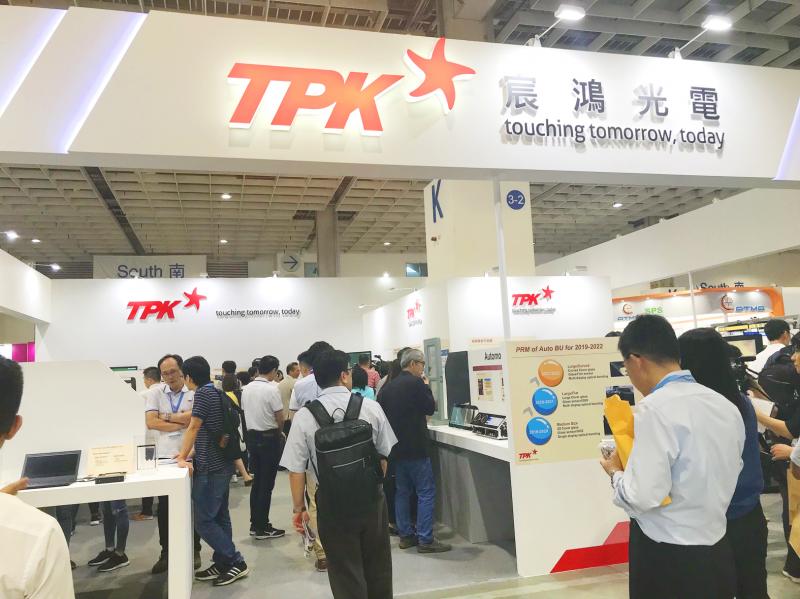Touch module and sensor supplier TPK Holding Co (宸鴻) yesterday gave a dismal revenue outlook for this quarter due to order losses.
Revenue is forecast to slump between 20 and 25 percent from NT$32.85 billion (US$1.14 billion) last quarter, TPK chief strategic officer Freddie Liu (劉詩亮) told investors in a teleconference.
Liu attributed the projected contraction mainly to a dearth of new orders.

Photo: Chen Mei-ying, Taipei Times
“As customers are monitoring how the COVID-19 pandemic will affect sales of end products over the next one to two months, we are conservative about the fourth-quarter outlook,” Liu said. “On top of that, the company is facing a product transition period, meaning new product output will not be as good as before.”
One of TPK’s clients has adjusted its specifications for smartphones and did not place orders for TPK’s touch display lamination services, Liu said.
As a result, TPK expects a continuous decline in revenue from the smartphone segment in the short to medium term, he said.
TPK’s revenue last month dipped 27.2 percent to NT$7.71 billion from NT$10.59 billion in September, and declined 46.7 percent compared with NT$14.48 billion a year earlier, he said.
The smartphone segment is the second-largest revenue source for TPK, making up 34 percent of its total revenue last quarter, a company financial statement showed.
The firm is seeking new business to fill the void over the next few quarters, Liu said.
TPK faces a mounting risk of weakening revenue due to a seasonal downturn, he said.
“The effect of the slow season is usually very severe,” he said.
The company expects to remain profitable this quarter through further improvement in operating efficiency and cost savings, Liu said.
Operating margin is expected to be between 0.5 and 1 percent this quarter, compared with 0.7 percent last quarter, he said.
TPK continues to benefit from growing demand for touch display solutions used in notebook computers and tablets amid remote working and online-learning trends due to the COVID-19 pandemic, TPK chief executive officer Leo Hsieh (謝立群) said.
“The growth momentum for tablets is quite healthy in the fourth quarter, mostly due to the pandemic,” Hsieh said.
The final quarter of the year is usually the peak season for tablets and laptops, he said.
TPK reported that net profit surged about 44 percent quarterly to NT$443 million last quarter, the highest in 10 quarters, boosted by NT$65 million in currency arbitrage gains.
On an annual basis, net profit skyrocketed 93.8 percent from NT$228 million.
Earnings per share jumped to NT$1.09 last quarter from NT$0.76 in the preceding quarter and NT$0.56 a year earlier.
Regular-sized tablets contributed 20 percent to TPK’s revenue last quarter, while notebook computers and larger tablets made up the biggest revenue share of 41 percent, the financial statement showed.

KEEPING UP: The acquisition of a cleanroom in Taiwan would enable Micron to increase production in a market where demand continues to outpace supply, a Micron official said Micron Technology Inc has signed a letter of intent to buy a fabrication site in Taiwan from Powerchip Semiconductor Manufacturing Corp (力積電) for US$1.8 billion to expand its production of memory chips. Micron would take control of the P5 site in Miaoli County’s Tongluo Township (銅鑼) and plans to ramp up DRAM production in phases after the transaction closes in the second quarter, the company said in a statement on Saturday. The acquisition includes an existing 12 inch fab cleanroom of 27,871m2 and would further position Micron to address growing global demand for memory solutions, the company said. Micron expects the transaction to

Nvidia Corp’s GB300 platform is expected to account for 70 to 80 percent of global artificial intelligence (AI) server rack shipments this year, while adoption of its next-generation Vera Rubin 200 platform is to gradually gain momentum after the third quarter of the year, TrendForce Corp (集邦科技) said. Servers based on Nvidia’s GB300 chips entered mass production last quarter and they are expected to become the mainstay models for Taiwanese server manufacturers this year, Trendforce analyst Frank Kung (龔明德) said in an interview. This year is expected to be a breakout year for AI servers based on a variety of chips, as

Global semiconductor stocks advanced yesterday, as comments by Nvidia Corp chief executive officer Jensen Huang (黃仁勳) at Davos, Switzerland, helped reinforce investor enthusiasm for artificial intelligence (AI). Samsung Electronics Co gained as much as 5 percent to an all-time high, helping drive South Korea’s benchmark KOSPI above 5,000 for the first time. That came after the Philadelphia Semiconductor Index rose more than 3 percent to a fresh record on Wednesday, with a boost from Nvidia. The gains came amid broad risk-on trade after US President Donald Trump withdrew his threat of tariffs on some European nations over backing for Greenland. Huang further

HSBC Bank Taiwan Ltd (匯豐台灣商銀) and the Taiwan High Prosecutors Office recently signed a memorandum of understanding (MOU) to enhance cooperation on the suspicious transaction analysis mechanism. This landmark agreement makes HSBC the first foreign bank in Taiwan to establish such a partnership with the High Prosecutors Office, underscoring its commitment to active anti-fraud initiatives, financial inclusion, and the “Treating Customers Fairly” principle. Through this deep public-private collaboration, both parties aim to co-create a secure financial ecosystem via early warning detection and precise fraud prevention technologies. At the signing ceremony, HSBC Taiwan CEO and head of banking Adam Chen (陳志堅)